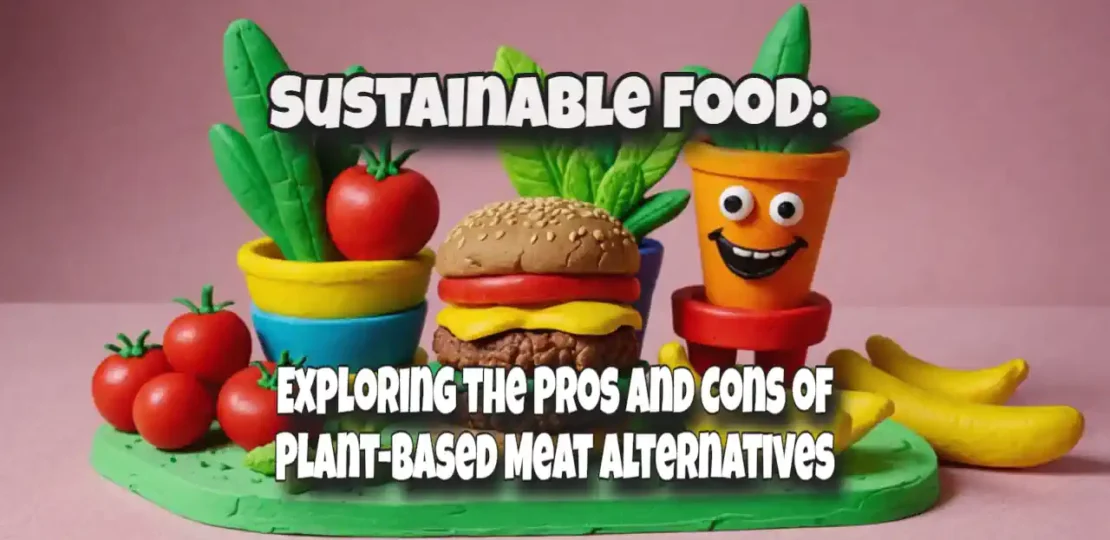Sustainable Food: Exploring the Pros and Cons of Plant-Based Meat Alternatives
August 15, 2024 | by Steve Last

Considering the benefits and drawbacks of plant-based meat alternatives in the context of the environmental, social, and economic aspects of sustainable food production.
The rise of plant-based meat alternatives is a response to the growing demand for more sustainable food sources. With concerns over methane emissions from livestock, environmental degradation, and the finite nature of natural resources, many consumers are turning to alternatives like vegan burgers, lab-grown meat, and veggie sausages. But how sustainable are these options really? In this article, we’ll explore the various types and flavors of these alternatives, weigh their pros and cons, and evaluate their broader environmental and social impacts.
Sustainable Food: Key Takeaways
- Vegan Burgers: Typically made from soy, pea protein, or other plant-based ingredients, these products are designed to mimic the taste and texture of traditional beef burgers. They have a lower carbon footprint but come with concerns over agricultural practices and resource use.
- Lab-Grown Meat: Also known as cultured meat, this emerging technology creates meat products from animal cells without raising livestock. While promising in reducing methane emissions and land use, it remains energy-intensive and expensive.
- Veggie Sausages: Made from a variety of vegetables, grains, and legumes, these sausages offer a healthier alternative but may lack the meaty texture some consumers desire. They are typically more environmentally friendly but can vary significantly in their sustainability depending on ingredients.
Vegan Burgers: Types, Flavors, and Sustainability
Sustainable Food: Types and Flavors
Vegan burgers are often made from ingredients like soy, pea protein, lentils, and mushrooms. Leading brands like Beyond Meat and Impossible Foods have gained popularity for their burgers that closely resemble traditional beef in both taste and texture. These products are often seasoned to enhance the flavour, with smoky, umami, and savoury profiles being the most common.
Pros
- Lower Greenhouse Gas Emissions: Vegan burgers produce significantly fewer greenhouse gases than beef burgers. For example, producing a Beyond Burger is said to generate 90% less greenhouse gas emissions compared to a beef burger.
- Reduced Land Use: Plant-based burgers require less land to produce than beef, helping to preserve forests and other natural ecosystems.
- Animal Welfare: By eliminating the need for livestock, vegan burgers contribute to reduced animal suffering.
Cons
- Resource-Intensive Crops: Ingredients like soy and peas can be resource-intensive, particularly in terms of water and land use. Large-scale monoculture farming of these crops can also lead to soil depletion and biodiversity loss.
- Nutritional Concerns: Some vegan burgers may be highly processed and contain additives, which can detract from their health benefits.
Lab-Grown Meat: The Future of Sustainable Protein?
What is Lab-Grown Meat?
Lab-grown meat, or cultured meat, is created by cultivating animal cells in a lab environment. The process involves extracting cells from an animal and growing them in a nutrient-rich medium until they form muscle tissue that can be harvested and consumed.

Pros
- Significantly Reduced Methane Emissions: As lab-grown meat does not involve raising livestock, it virtually eliminates methane emissions associated with traditional animal farming.
- Efficient Land Use: Lab-grown meat production requires far less land compared to conventional livestock farming, potentially allowing more land to be preserved or repurposed for other uses.
- Scalability: As the technology advances, lab-grown meat could be produced in urban areas, reducing transportation emissions and improving food security.
Cons
- Energy-Intensive Production: Current lab-grown meat production is highly energy-intensive, which could offset some of its environmental benefits if renewable energy sources are not used.
- High Costs: The technology is still in its infancy and is currently much more expensive than traditional meat or plant-based alternatives.
- Consumer Acceptance: There are cultural and psychological barriers to widespread adoption, as many consumers are hesitant to try lab-grown products.
Veggie Sausages: A Versatile and Eco-Friendly Option
Sustainable Food: Types and Flavors
Veggie sausages are made from a variety of ingredients, including vegetables like carrots, mushrooms, and zucchini, as well as grains and legumes such as quinoa, lentils, and chickpeas. They come in a range of flavors, from spicy and smoky to herby and mild, catering to different taste preferences.
Pros
- Low Environmental Impact: Veggie sausages generally have a smaller environmental footprint than meat-based sausages, especially when made from locally sourced, organic ingredients.
- Diverse Nutritional Profile: Depending on the ingredients, veggie sausages can be rich in fiber, vitamins, and minerals, offering a healthy alternative to processed meat sausages.
- Minimal Resource Use: Unlike monoculture crops, the diverse ingredients used in veggie sausages often require fewer resources and contribute to soil health.
Cons
- Texture and Flavor Limitations: Some consumers find veggie sausages lacking the meaty texture and flavor they desire, which can limit their appeal.
- Ingredient Sourcing: The sustainability of veggie sausages can vary depending on the sourcing of their ingredients. For instance, imported or non-seasonal vegetables can increase the carbon footprint.
Broader Environmental and Social Impact of this Sustainable Food
Climate Change and Methane Emissions
One of the main drivers for the shift towards plant-based and lab-grown alternatives is the significant reduction in methane emissions. Livestock farming is a major source of methane, a potent greenhouse gas. By reducing the demand for animal-based products, these alternatives can play a crucial role in mitigating climate change.
Resource Use and Crop Production
While plant-based alternatives generally have a lower carbon footprint, the production of key ingredients like soy and peas can strain water and land resources. Moreover, the reliance on monoculture farming for these crops can lead to environmental degradation, including soil erosion and loss of biodiversity.
Social and Economic Impact
The rise of plant-based and lab-grown alternatives also has social implications. On one hand, these industries can create new economic opportunities, particularly in urban areas. On the other hand, they may disrupt traditional farming communities and food systems, leading to potential economic and social challenges.
Sustainable Food: FAQs
What are the main ingredients in vegan burgers?
Vegan burgers are typically made from plant-based ingredients such as soy, pea protein, lentils, and mushrooms. These ingredients are chosen for their ability to mimic the taste and texture of traditional beef.
Is lab-grown meat available on the market?
As of now, lab-grown meat is not widely available on the market. It is still in the developmental stage, with some sustainable food companies beginning to offer limited products in select markets. The high cost and regulatory hurdles are major factors in its limited availability.
How do veggie sausages compare to meat sausages in terms of sustainability?
Veggie sausages generally have a smaller environmental footprint than meat sausages, particularly when made from locally sourced and organic ingredients. However, the sustainability of veggie sausages can vary depending on the sourcing and production methods of their ingredients.
What are the environmental concerns associated with plant-based meat alternatives?
While plant-based meat alternatives generally have a lower carbon footprint, there are concerns about the resource-intensive nature of some crops used in their production, such as soy and peas. Additionally, large-scale monoculture farming of these crops can lead to soil depletion and loss of biodiversity.
Can plant-based and lab-grown alternatives completely replace traditional meat?
While plant-based and lab-grown alternatives offer promising solutions, it is unlikely that they will completely replace traditional meat in the near future. Factors such as consumer preferences, cultural norms, and the current limitations of these technologies mean that traditional meat will likely continue to play a role in global diets.
Sustainable Food:
In conclusion, while plant-based meat alternatives, lab-grown meat, and veggie sausages offer significant sustainability benefits, they are not without their challenges.
Each option presents a unique set of pros and cons, and their overall impact on the environment and society depends on a variety of factors, including production methods, ingredient sourcing, and consumer acceptance.
As the demand for sustainable food continues to grow, these alternatives will play an increasingly important role in shaping the future of our food systems.
RELATED POSTS
View all


